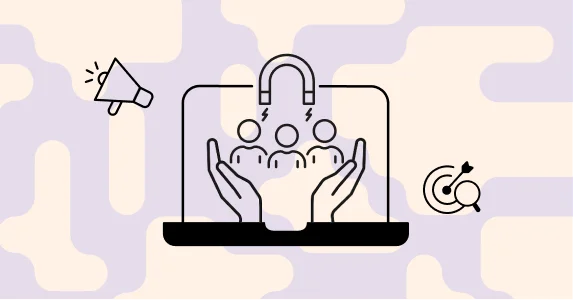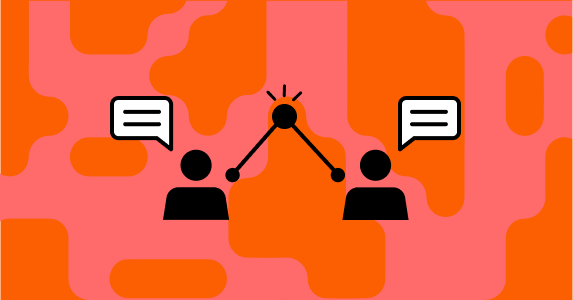By 2026, customer engagement will hinge on agentic marketing — where AI systems don’t wait for commands but act on intent.
The top platforms will combine six core AI capabilities to think, decide, and optimize autonomously, driving smarter personalization, retention, and measurable ROI.
Once, automation was the hero of the marketing world.
It sent our emails, scheduled our social posts, and kept the campaign wheels spinning while we slept.
Every day, marketers everywhere relied on it — trusting automation to save time, cut errors, and deliver results.
But over time, something strange happened: the world changed faster than our workflows.
Then came the rise of large language models (LLMs). Suddenly, AI wasn’t just a helper — it could think, write, predict, and even persuade.
Campaigns that once took weeks were being built in hours. Marketers were no longer just using software; they were collaborating with intelligence.
Because of that, a new kind of marketing began to emerge — Agentic Marketing, where systems don’t wait for instructions. They set goals, make decisions, and act on their own.
And now, imagine this:
You’re the CMO of a global ecommerce brand. You want to launch a new campaign tomorrow.
No panic. No endless meetings.
Your AI-powered engagement stack, your team of digital agents, has already segmented the audience, written the content, timed the sends, and optimized the journey before your coffee gets cold. That’s not a scene from the future.
That’s 2026, the dawn of agentic marketing, where automation finally evolves further and starts to think.
8 Ways AI Is Used in Customer Engagement
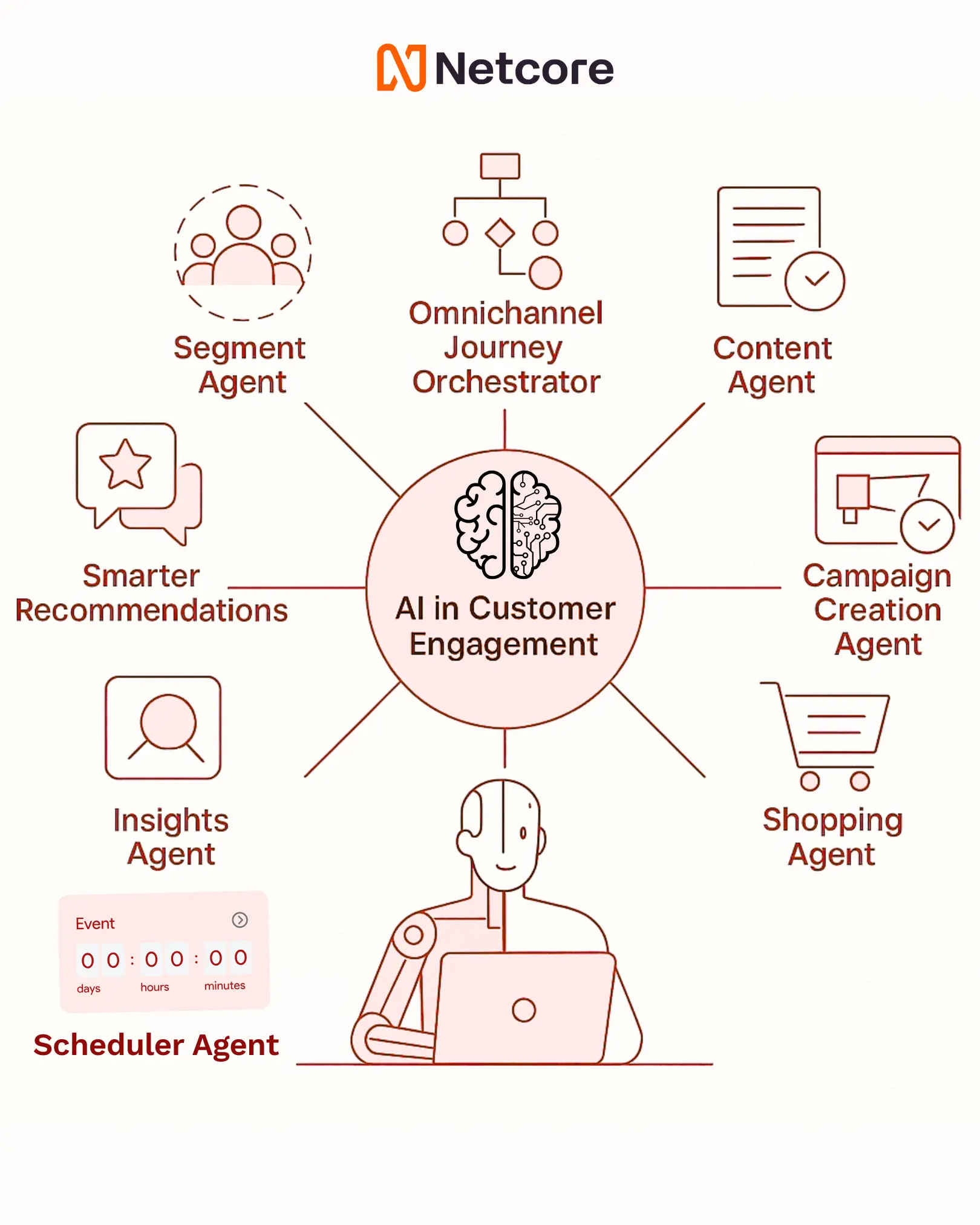
AI has evolved from a tool into a team member. The best customer engagement platforms today operate through a network of specialized AI agents — each mastering a function of marketing and collaborating in real time.
Here’s how they’re transforming every part of the engagement journey:
1. Segment Agent: Predictive Intelligence at Scale
No more static lists. The Segment Agent creates dynamic, evolving micro-segments based on over 500 behavioral and affinity data points from purchase intent and churn risk to lifetime value.
Your audience isn’t a snapshot anymore; it’s a live, breathing model that changes with every click, scroll, and cart abandonment.
2. Omnichannel Journey Orchestrator: Strategy in Motion
Think of it as your campaign’s conductor. The Journey Orchestrator coordinates specialized agents — content, scheduler, and shopping to achieve a specific marketing objective. For eg: Improve repeat purchase rates.
Email, WhatsApp, web push, app, and SMS no longer run in silos. Every channel plays in sync, dynamically adjusting to each customer’s context.
3. Scheduler Agent
Ever wonder why some messages land perfectly while others vanish into inbox oblivion?
The Scheduler Agent learns when each user is most likely to engage and which channel they prefer. It personalizes send times to reduce fatigue and lift CTRs automatically.
4. Content Agent
A single prompt can now create an entire campaign.
The Content Agent generates subject lines, visuals, and message variants across email, app, and web push. Further, it continuously A/B tests them to fight fatigue and help improve performance.
Your content pipeline goes from weeks to minutes, without sacrificing brand tone or quality.
5. Campaign Creation Agent
The dream scenario for every marketer: build, test, and launch a campaign in minutes.
This agent studies previous campaign performance, identifies high-performing templates, auto-generates creatives aligned with your brand, links pre-built segments, and deploys instantly.
No dev tickets. No waiting on creative teams. Just pure marketing velocity.
6. Shopping Agent: The Virtual Sales Expert
This one’s changing ecommerce forever.
The Shopping Agent acts like an in-store associate, instantly suggesting the perfect products, bundles, or upgrades for each shopper. Whether in chat, inbox, or web, it personalizes recommendations in real time.
Customers don’t just browse. They buy faster.
7. Insights Agent: Your 30-Second Optimizer
Data dashboards are dead.
The Insights Agent surfaces quick, actionable insights right inside your workspace — in under 30 seconds. It diagnoses what’s working, predicts next-best actions, and even triggers campaign optimizations automatically.
8. Smarter Recommendations: True 1:1 Targeting
No two customers see the same thing.
AI dynamically adjusts homepage banners, product listings, exit pop-ups, and email content based on live user behavior, creating an experience that feels handcrafted for every individual.
The 5 Proven AI Customer Engagement Strategies
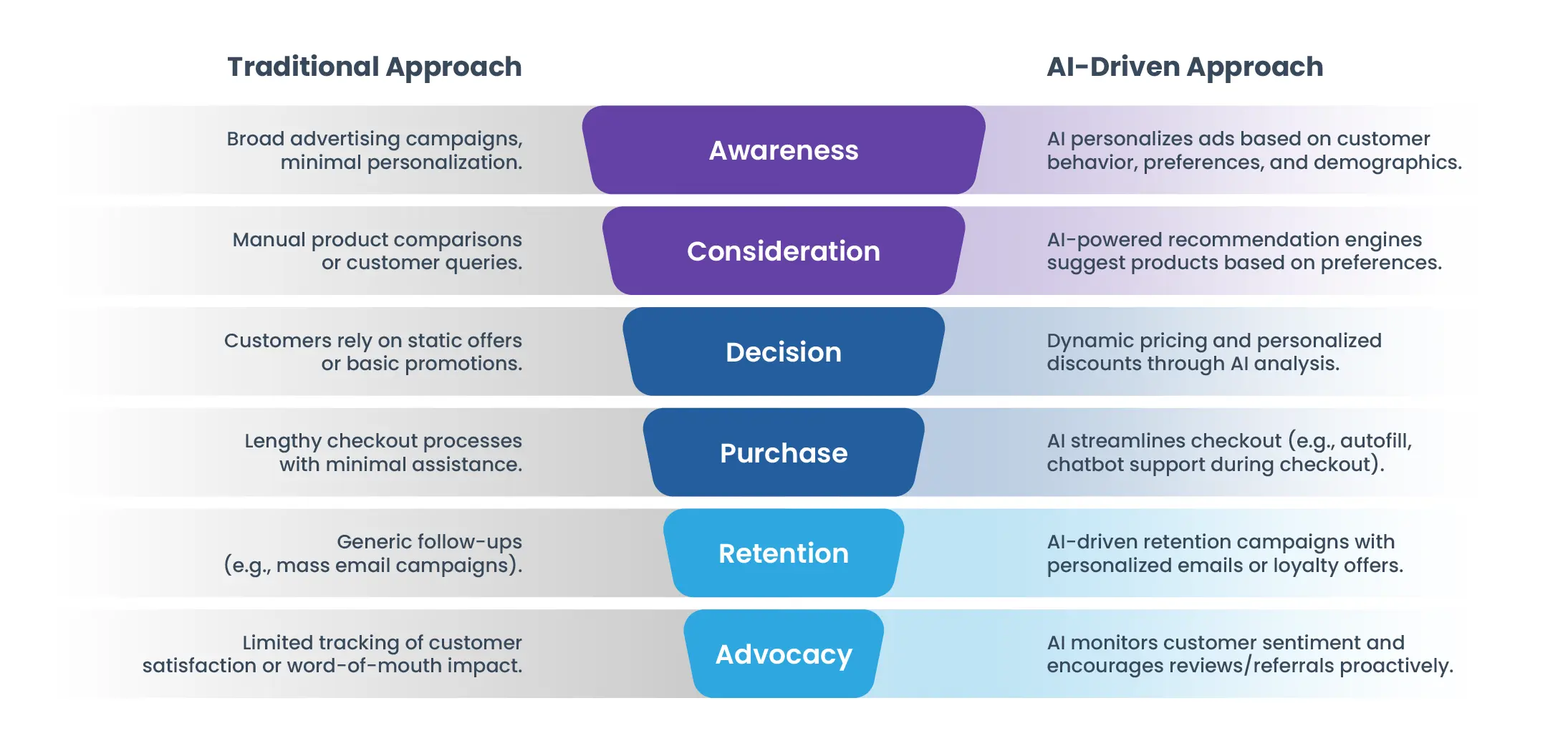
Let’s be clear: AI doesn’t make marketers obsolete, it makes them superhuman.
Here are the strategies the best teams are using right now to dominate engagement.
1. Predictive Personalization
Anticipate what your customers want before they do. From predicting who’s likely to buy next to identifying when they’ll drop off, predictive AI makes engagement proactive, not reactive.
Example: Netflix’s algorithm drives over 80% of views, not by guessing, but by understanding.
2. Omnichannel Journey Automation
Your customers don’t think in channels. Neither should your campaigns.
AI now ensures seamless continuity between email, web, push, WhatsApp, and in-app experiences.
Example: A user adds shoes to the cart, gets a WhatsApp nudge 12 hours later, and completes the purchase without leaving chat.
3. Dynamic Content Generation
With generative AI, every message evolves.
Subject lines adapt, visuals change, and CTAs shift based on performance data — all automatically.
4. AI-Powered Retention & Win-Back
AI predicts who’s slipping away and activates win-back journeys before churn happens.
Instead of reacquiring lost customers, you retain the ones you already have — reducing ad waste dramatically.
5. Adaptive Experimentation
Forget A/B testing; think A-to-Infinity testing.
AI can simultaneously test dozens of creative and delivery variations — learning what works faster than any human team could.
How to Measure ROI of AI in Customer Engagement
AI’s value lies in measurable business impact, not just campaign sophistication. As agentic marketing evolves, you must proactively track key outcomes that align with your specific business goals to measure success.
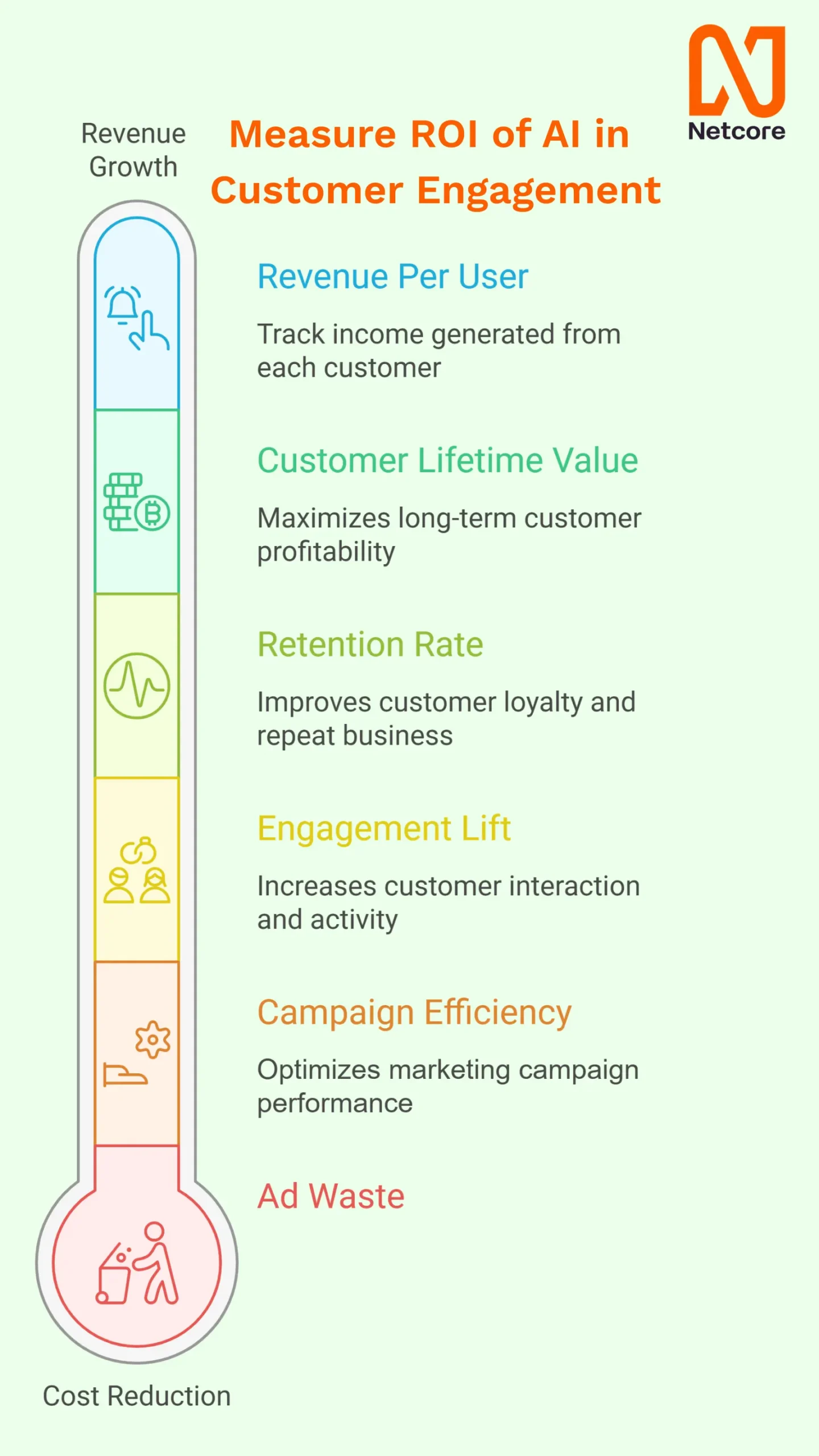
The Metrics That Matter
- Customer Lifetime Value (CLV): The gold standard for sustained growth.
- Retention Rate: Proof that personalization drives loyalty.
- Campaign Efficiency: How quickly can you go from idea to execution?
- Engagement Lift: Opens, clicks, conversions — all rising.
- Ad Waste Reduction: Less money wasted reacquiring the same customers.
- Revenue Per User (RPU): The ultimate metric of AI impact.
These metrics will help you track how your marketing efforts are improving the customer experience.
Challenges and Considerations When Implementing AI
AI promises intelligence — but it needs infrastructure.
The Common Pitfalls
- Data Fragmentation: Siloed data limits personalization.
- Explainability: Marketers need visibility into AI’s decisions.
- Scalability: Many tools break under enterprise volume.
- Skills Gap: Teams must learn to collaborate with AI, not just use it.
- Ethics & Compliance: GDPR and CCPA aren’t optional — they’re mandatory.
The fix? Choose a platform built for transparency, governance, and accountability — not just automation.
How Netcore Uses AI to Transform Customer Engagement
Netcore didn’t just bolt AI onto marketing. It built an agentic architecture from the ground up.
Core Capabilities
- Segment Agent: Predicts who’s most likely to buy, churn, or uninstall.
- Content Agent: Auto-generates and tests personalized content variants.
- Scheduler Agent: Optimizes send times and channels per user.
- Shopping Agent: Powers in-message commerce with personalized recommendations.
- Insights Agent: Delivers actionable insights in under 30 seconds.
Proof in Action
Brands like Pomelo Fashion saw a 30% lift in conversions within weeks of migration — thanks to Netcore’s agentic stack.
And it’s not just about automation. It’s about giving marketing teams an AI partner that learns, acts, and drives outcomes autonomously — all while maintaining compliance, control, and creative oversight.
The Rise of the Intelligent Marketer
The next great marketer won’t just use AI — they’ll lead it.
They’ll be half strategist, half technologist.
Half creative, half conductor of autonomous systems that think, learn, and act in real time.
Before: endless dashboards and manual workflows.
After: AI agents collaborating with humans to run marketing that’s faster, smarter, and more profitable.
Implication: Marketers who embrace this hybrid model today will outlearn, optimize, and outperform everyone else tomorrow.
Final Take
If your organization is still navigating the complexities of marketing automation, achieving true 1:1 personalization will remain an uphill journey.
Agentic Marketing changes that trajectory. It’s not just about accelerating execution — it’s about driving intelligent efficiency. By combining speed with adaptive decision-making, brands can deliver hyper-personalized experiences at scale.
AI is no longer a promise for the future — it’s the foundation of today’s marketing advantage. The leaders who act now will define the next decade of customer engagement.
Partner with Netcore to create your Agentic marketing powered, customer engagement strategy — one that learns continuously, acts autonomously, and scales success intelligently.
 Worried About Your AI Marketing Strategy? Read the Agentic Marketing 2026 Predictions Report! →
Worried About Your AI Marketing Strategy? Read the Agentic Marketing 2026 Predictions Report! →






